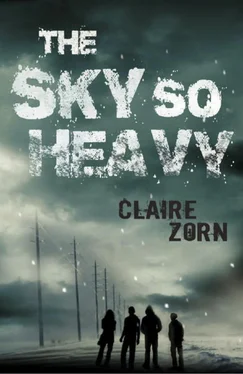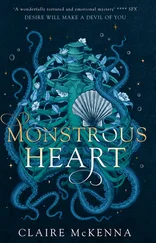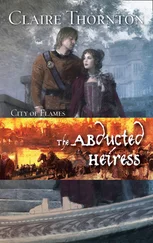I nodded. ‘We’ve got a fair bit. Mum was really worried about shortages.’
‘Okay. You know where we are. Try not to worry about your dad.’
I said goodbye to Mrs White and watched her dogs pull her up the driveway. I took off my socks. I put them out on the porch beside the tracksuit pants I had worn the other day and closed the door.
Our house started to show symptoms of neglect – the grotty kind that comes from having only male occupants under the age of twenty. The kitchen had become a festering dump and precarious towers of dishes had grown over the bench tops. There might have been a time when you could joke about it being a toxic-waste hazard, but now comments like that didn’t seem funny.
This is embarrassing and I really don’t want to admit it, but neither of us had washed since the power went off. The thought of stripping off and washing in freezing and possibly radioactive water wasn’t exactly enticing. But it wasn’t until after I had been exposed to the fresh air when I was talking to Mrs White that I noticed the putrid, stale smell mulling in our house; one part body odour, two parts Rexona and one part vanilla-scented candles. I’m also ashamed to say that I didn’t really notice the neglected state of the kitchen either until we ran out of clean plates. I couldn’t remember the last time I had done washing-up. Before we got a dishwasher Max and I used to whine about having to do the washing-up and beg for a dishwasher. Mum would say that if we had a dishwasher we’d just whine about unpacking it and we were like ‘No way!’ But she was right, we did. Spoilt brats.
I cleared everything out of the sink – piling dishes on the floor when I ran out of bench space – and located the plug underneath a damp dishcloth that smelled like a rotting carcass. I opened one of the bottles of water and sloshed the bare minimum into the sink. It would be the dodgiest washing-up job of all time, but I didn’t want to waste water that could be drunk. I woke Max to help wipe up, something which would normally cause a fair amount of pre-teen wrath, but this time didn’t get much response. He silently trudged into the kitchen and began wiping the dishes. His fingers were bone white. Max doesn’t have the kind of surface area to volume ratio that lends itself to heat retention. (Thank you biology class.) He never did. When we used to go to swimming lessons he would last a maximum of twenty minutes in the water before the instructors started to worry about public liability and let him get out.
He told me quietly that he was really cold.
‘How many layers you got on?’ I asked him.
‘Five. Can hardly move.’
‘I’m sorry, dude… It’ll be over soon.’
‘You don’t know that.’
‘No. I don’t… but…’
He put down the tea towel and looked up at me. ‘What’s going to happen, Fin?’
‘I don’t know.’
‘It’s really cold. We have to light the fire.’
‘We don’t have any dry wood.’
‘We have to find some. Have to try and dry it out. Fin, I’m really cold.’
Where the hell was I going to find dry firewood? The furniture? After we’d done the washing-up I told Max to stay inside and find some newspaper. I went out the front door, put the tracksuit pants and hoodie on over my clothes and nudged my feet into my sneakers without touching them.
Dad kept the firewood stacked down the side of the house, against the wall, under the eaves. He used to keep it covered with a heavy tarp, but we hadn’t been near the pile that winter. I had actually noticed the tarp lying on the ground once when I was putting the bins out and hadn’t even bothered to put it back on. Surely someone, somewhere, was getting a laugh out of that.
The logs were piled to about waist height. Wedges of turpentine: the kind of thick stringy bark that flints away and gets wedged under your fingernails. I brushed the ice off them and lifted the logs from the pile one by one. I dropped them each by my feet where they landed with a dull thud. I thought maybe the ones right at the bottom of the pile would be the driest and I was right. With heavy lugs of the axe I split them into smaller wedges. Then I carried all the wood, dry and damp, up to the porch. I took off my shoes, hoodie and tracksuit pants and took each damp piece of wood in, stacking them against the kitchen wall. It took an age. When I was done I gathered up the smaller dry pieces and took them into the living room.
Max had found a few old newspapers in the garage. We scrunched the sheets into balls and stuffed them into the fireplace. I made a little tepee over the top with the thinnest strips of wood, my substitute for kindling. Max lit a match and threw it in. The newspaper caught fire and the room lit up with the sudden glow. Max and I watched the fire intently as it devoured the newspaper and flames shot and rumbled up the chimney. The tongues of flame lapped and curled around the shards of wood. I waited until the fire built before carefully placing a larger log inside. We didn’t breathe, waiting to see if the wood would catch. Finally, just as the fire ran out of kindling and started to die away, the turpentine bark flared and a long thin flame quivered and reached up. Max and I exhaled. We rocked back onto our bums and hugged our knees, gazing at the flame.
The knock at the door startled us, like a teacher shouting from the front of the classroom when you didn’t know you were doing anything wrong. Max and I looked at each other. The knock sounded again. Dad wouldn’t knock. I got to my feet and went to the door, Max at my heels. I looked through the peephole: cops – one guy and one girl. Hot worry rushed thick and black through me. I swallowed and opened the door. The girl beamed at me.
‘Hi there, I’m Constable Lund, this is Senior Constable Palmer. We’re just doing a whip around the neighbourhood to see how everyone’s doing with the power out. Your mum or dad home?’
‘No.’
‘No?’
She was young with a kindergarten-teacher smile. The guy was putting on a serious ‘I’m a cop, you’re not’ face. He was older than her but not by much.
‘Our dad went out Wednesday night. Hasn’t come back. I reckon he must be stuck because of the ice.’
Practice was making it easier to say, almost. Constable Lund nodded.
‘There’s been road closures. We’ve got a lot of people stuck on the freeway, they’ve been taken to shelter until we can open the roads again. I’m guessing you haven’t had any phone contact with your dad? Most of the servers are down.’
‘No.’
‘Hmm.’ She took out a notebook. ‘What’s your dad’s name?’
‘Greg Heath.’
The guy turned away and said something into his radio. I heard Dad’s name.
‘Why is the power down? When will it be on again?’
‘Apparently it’s because of the amount of carbon in the air. We really don’t know when it will be back up. I’m sorry we can’t give you better news. Are there any adults in the house?’
‘Just me and my brother.’
‘How old are you?’
‘Eighteen,’ I lied.
Constable Lund looked concerned. It suited her. Her partner was clearly trying to come over all CSI . It wasn’t really working out for him. He finished talking on his radio and joined us again.
‘I’ve put a call out to try and get some info on the whereabouts of your dad,’ he said.
‘Okay.’
‘Is there a neighbour you can stay with, so you’re not on your own?’ Constable Lund asked.
‘We’re doing okay.’
‘Do you have enough food for the moment?’
‘Yeah, we’re pretty stocked up.’
‘Good. We’re advising people to stay inside as much as possible.’
‘Is the snow radioactive?’
She glanced at CSI. ‘We really don’t know yet. We don’t have that equipment; the defence force is taking care of those investigations. Just try to stay inside, okay? Do you have bottled water?’
Читать дальше












